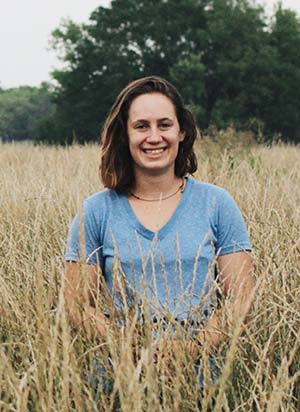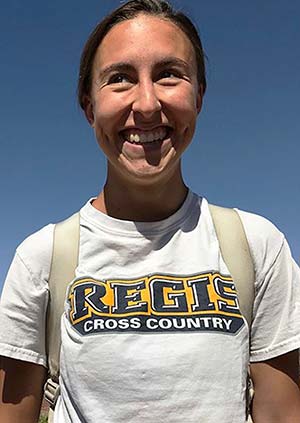
Theodora Zastrocky will research supermassive black holes at the center of galaxies, while Hannah Rodgers will look at things a little closer to Earth, specifically examining soil microbiology.
The two University of Wyoming graduate students are recipients of National Science Foundation (NSF) Graduate Research Fellowships.
The NSF Graduate Research Fellowship is among the nation’s most highly competitive awards for graduate studies. Fellowships provide each student with a three-year annual stipend of $34,000 along with a $12,000 cost of education allowance for tuition and fees -- paid to the institution -- as well as access to opportunities for professional development available to NSF-supported graduate students. Fellowships may only be used for an eligible graduate degree program at an academic institution accredited in and having a campus located in the U.S., its territories, possessions or the Commonwealth of Puerto Rico.
“I will study sustainable agriculture and soil science, with a focus on soil microbiology in the labs of Jay Norton and Linda van Diepen,” says Rodgers, a first-year Ph.D. student from St. Louis, Mo., who is studying soil science. “Specifically, I want to see how agricultural management decisions -- crop rotation, fertilization and tillage -- affect soil microbes, and how soil microbiology can be used to monitor soil health and inform sustainability efforts in agriculture.”
Norton is a professor in the UW Department of Ecosystem Science and Management, and van Diepen is an assistant professor in the department.
“Eventually, I want to be part of an effort to support farmers in transitioning to sustainable practices as part of a nonprofit or government group, such as the Soil Health Institute, extension or the Sustainable Agriculture Research and Education program,” Rodgers says.

Zastrocky, a first-year Ph.D. student from Durango, Colo., majoring in astronomy, will work with Mike Brotherton, a professor in the UW Department of Physics and Astronomy, on the Monitoring AGNs (active galactic nuclei) with Hbeta Asymmetry project.
“This fellowship allows me to get started in research right away rather than needing to be a TA (teaching assistant) my first year,” Zastrocky explains. “It also gives me flexibility in what projects I choose to work on.”
NSF Fellows are knowledgeable experts who can contribute significantly to research, teaching, and innovations in science and engineering. These individuals are crucial to maintaining and advancing the nation's technological infrastructure and national security as well as contributing to the economic well-being of society.
About the NSF Graduate Research Fellowship
Launched in 1952 shortly after Congress established the NSF, the Graduate Research Fellowship Program represents the nation's oldest continuous investment in the U.S. STEM (science, technology, engineering and mathematics) workforce.
The Graduate Research Fellowship Program is a vital part of NSF efforts to foster and promote excellence in U.S. science, technology, engineering and mathematics by recognizing talent broadly from across the nation and U.S. territories. The awards are provided to individuals who have demonstrated their potential for significant research achievements.
Since the program’s inception, NSF has funded over 50,000 Graduate Research Fellowships out of more than 500,000 applicants. Currently, 42 fellows have gone on to become Nobel laureates, and more than 450 have become members of the National Academy of Sciences. Additionally, the Graduate Research Fellowship Program has a high rate of doctorate degree completion, with more than 70 percent of students completing their doctorates within 11 years.

